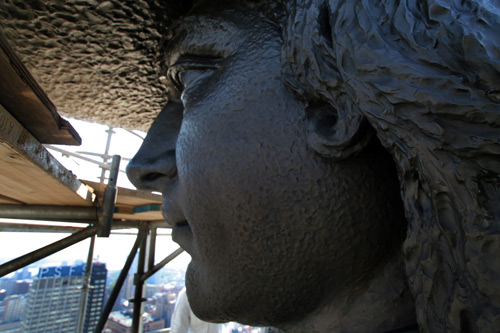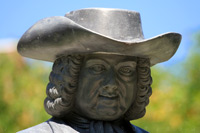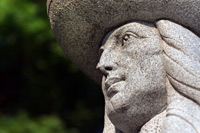19 September 08: The Possible City:
"To see something greater"
 by Nathaniel Popkin September 19, 2008 "He was quite a contradictory fellow," says Sam Katz, explaining his new-found fascination with William Penn. "We tend to think of him as the grandfather of religious freedom, which he was, but he was also the largest private landholder in the world." Penn was a slaveholder who granted broad freedoms, a benevolent dictator who formed one of the world's first democracies, a member of the English aristocracy who continuously worked to undermine its authority, a pacifist who put down an Irish uprising, and whose status in the eyes of the King was derived from his father's heroic service in war, and as Steve Conn, in Metropolitan Philadelphia, observes, simultaneously Philadelphia's first citizen and its first suburbanite. And Katz, the businessman who would have been mayor, wants to tell the story. Last April, after renting Ric Burns' documentary history New York, Katz searched for something similar on Philadelphia. He found instead Chicago: City of the Century, Las Vegas: An Unconventional City, and American Experience: New Orleans. Now, after interviewing dozens of historians, journalists, and community leaders, and consuming about 200 books on the city's history, he's transformed himself into the executive producer of what's tentatively titled The Remaking of America's First City: Philadelphia, an ambitious film and multi-media project now in a developmental stage. (Disclosure: I'm part of the film-making team.)  "For somebody who thought he knew a lot about Philadelphia," Katz explains, "there was a huge gap in my knowledge, roughly between the Revolution and the election
of Richardson Dilworth as mayor. I began to suspect that a lot of what Philadelphia was -- is, might be -- is rooted in things about which people know nothing .
. . Turns out I knew nothing about William Penn."
"For somebody who thought he knew a lot about Philadelphia," Katz explains, "there was a huge gap in my knowledge, roughly between the Revolution and the election
of Richardson Dilworth as mayor. I began to suspect that a lot of what Philadelphia was -- is, might be -- is rooted in things about which people know nothing .
. . Turns out I knew nothing about William Penn." Katz tells me that Penn never thought of himself as a Philadelphian. "He occupied our river banks 17 months to three years. That's it. The rest is predicated on mythology," particularly Penn's dealings with the Lenape. In great contrast to other European settlers, including Lord Baltimore to the south and the Puritans to the north, Penn sought a different way. Instead of stealing, he purchased land; instead of subjugation, he legislated and enforced religious freedom. But, as Katz instructs, the Lenape he encountered were substantially (50-90%) weakened by disease wrought by the Swedes, Dutch, and other English settlers. Friendship was therefore easy. Later, when Penn's sons and his secretary James Logan enforced their land title, in a maneuver that led to the infamous "walking purchase," it was the Lenape who said, "William Penn would never have treated us this way." A myth was born.  It's a myth that defines us, not only as a city but a nation. Penn, according to Thomas Jefferson, was "the greatest law giver." A student of Locke and a
prolific writer, it was Penn who first gave us our national framework of government, declarations of personal and religious freedom, trial-by-jury, and free
elections.
It's a myth that defines us, not only as a city but a nation. Penn, according to Thomas Jefferson, was "the greatest law giver." A student of Locke and a
prolific writer, it was Penn who first gave us our national framework of government, declarations of personal and religious freedom, trial-by-jury, and free
elections. But Penn was also a land speculator, who sought to prove his political points by selling building lots to like-minded people. This combination of idealism and commerce, particularly, is what fascinates Katz. "First and foremost he left a place founded on a set of principals and ideals -- maybe even more so than the 1775-76 revolutionaries -- a welcoming place of practical government and democracy." In Philadelphia, he sought to correct the mistakes of London, 40% of which had burned in the fire of 1666, and Paris, perhaps the most rapacious -- and filthy -- city of the time, by planning a modern city. The west bank of the Delaware was the key to his colony's fortune. There lay the possible city. "He had the ability to look at something and to see something greater for the future," notes Katz, wondering if one of the elements of the Philadelphia story is that "we haven't had enough of those kinds of people." –Nathaniel Popkin nathaniel.popkin@gmail.com * * *  The grandfather of religious freedom in America, the man who withheld personal freedom. William Penn's contradictions didn't so much doom Philadelphia
from its onset as they complicated it. Over the past year, Nathaniel Popkin has examined these complexities with an optimistic eye but with at least one foot in
reality in a column called The Possible City. These columns have transcended into something larger, a book
of the same name, the second from Popkin the author, published by Camino
Books. (It also features six of my photos.)
The grandfather of religious freedom in America, the man who withheld personal freedom. William Penn's contradictions didn't so much doom Philadelphia
from its onset as they complicated it. Over the past year, Nathaniel Popkin has examined these complexities with an optimistic eye but with at least one foot in
reality in a column called The Possible City. These columns have transcended into something larger, a book
of the same name, the second from Popkin the author, published by Camino
Books. (It also features six of my photos.) This Sunday, September 21st, is a special date to us: It marks the first anniversary of The Possible City column. It marks the last day of summer 2008, the Summer of the Delaware, the series which has explored (and will continue to explore beyond summer) the river which Penn sailed up to find the land deeded him from the King of England. And, it marks the official launch of that book, so we'd love to have you come celebrate with us. What's Possible is the theme of the evening -- appropriately, a mostly optimistic but somewhat realistic discussion of, well, The Possible City. Join us for a salon in the mold of our previous For The Curious events, with Nathaniel, myself and City Paper editor-in-chief Brian Howard. We'll talk a little about how the column and book came to be and a lot about Philadelphia, Penn's holy experiment, our possible city. What's Possible: Sunday, September 21st at Johnny Brenda's, Frankford & Girard in Fishtown. Our start time is eyeballed for 8 o'clock, but we realize there is a 4:15 Steelers and Eagles game, so we'll save the best part of the conversation until at least 8:30, giving everyone plenty of time to make it to JB's. Best of all, the event is FREE. We'll also have books for sale, so if you haven't bought yours yet, you can pick one up at JB's. City Paper excerpted The Possible City last week, online HERE. –B Love |
|
• 18 September 08: Dwindling/rekindling possibilities • 26 August 08: TPC, NOW AVAILABLE IN PAPERBACK • 26 June 08: The Mother of Invention • 29 Apr 08: "This is not pie-in-the-sky" • 1 Apr 08: Recess/Re-assess • 7 Mar 08: One-City Art Movement, Open to Everyone • 24 Feb 08: Too late for the streetscape? • 15 Feb 08: "It really could be something." • 18 Jan 08: Estuary of Dreams • 11 Jan 08: More than shelter • 10 Jan 08: Nature's balance • 6 Dec 07: Snake uprising • 4 Dec 07: A Junction that ought to be • 6 Nov 07: Around the Mulberry Tree we go • 29 Oct 07: Wondering about wandering • 5 Oct 07: No other way • 21 Sept 07: Here is the Possible City |
